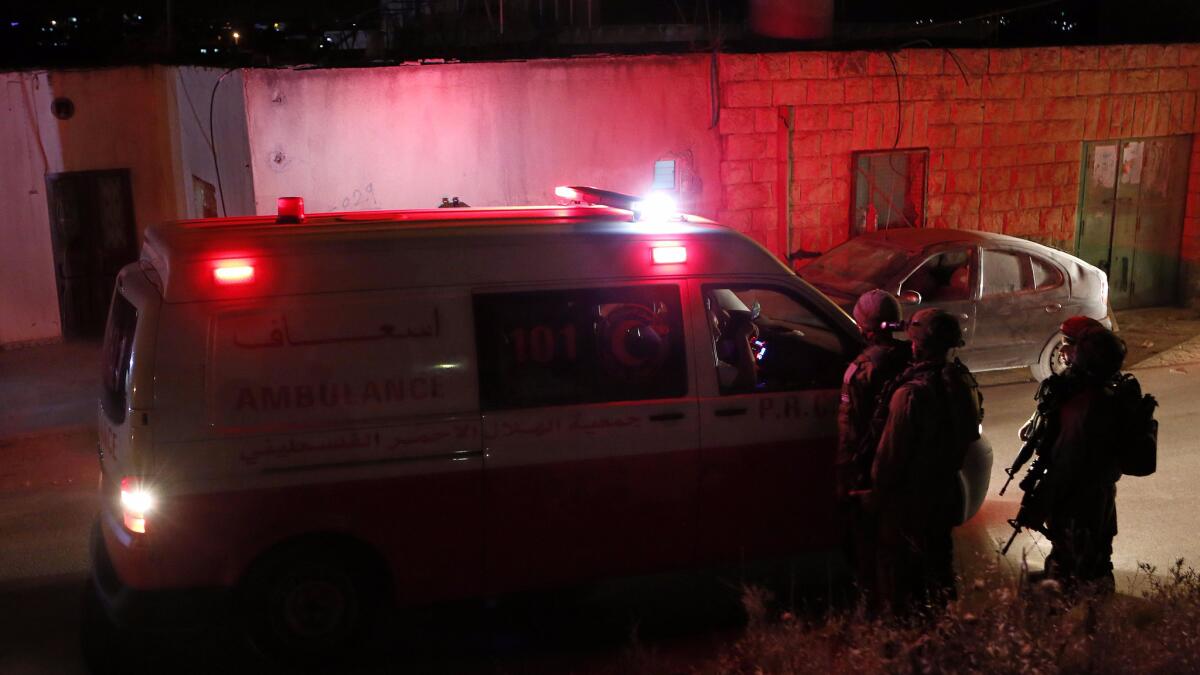Op-Ed: Are Democrats finally ready for a real debate on U.S.-Israel policy?

- Share via
Sen. Bernie Sanders’ campaign may now be winding down but its influence will certainly be felt at the Democratic convention, and possibly beyond. Sanders managed to appoint two defenders of Palestinian rights — Cornel West and James Zogby — to the committee drafting the Democratic Party’s platform.
It is to his credit that the candidate, who declined to criticize Israel’s conduct in Gaza and the West Bank until recently, took this opportunity. He understood that American public opinion on the Israeli-Palestinian conflict had evolved far past the positions of the political establishment. The party and the country as a whole are ready for an honest conversation about the consequences of America’s unconditional support for Israel.
On a recent trip to the West Bank, I felt the effects of America’s decades of lockstep support for Israel’s actions everywhere I went.
I spent time in the Palestinian village of Nabi Saleh, where 21 local youth — no small number in a village of 600 — were arrested in raids last fall. Such raids, in which soldiers storm an entire neighborhood, are still a nightly occurrence in the West Bank. The fate of those arrested is almost certain: 99.74% of Palestinians tried in Israel’s military courts are convicted. Two women in Nabi Saleh, leaders in the local protest movement, are under doctors’ orders to skip the village’s weekly demonstrations. They’ve been exposed to so much tear gas over the years that they risk kidney failure should Israeli troops break up the protests with gas, which they invariably do.
While I was there, protesters were sitting quietly on a hillside, posing no threat to anyone, when soldiers began firing high-velocity tear gas canisters. Disproportionate use of force by Israeli Defense Forces is not an exception but the general rule.
It’s been the rule in Hebron, the epicenter of the violence during much of last fall and winter. It was there in March that video captured an Israeli soldier executing 21-year-old Abdel Fattah al-Sharif as he lay prone on the ground. (The soldier’s arrest prompted an outpouring of support for his actions from the Israeli public.) For six months, the IDF declared much of the Hebron neighborhood of Tel Rumeida a “closed military zone,” forbidding all Palestinian non-residents from entering, even as Israeli settlers were free to come and go. Palestinian residents were issued numbers that they had to call out each time they crossed a checkpoint on their way home.
More Palestinians were displaced by home demolitions in the first three months of 2016 than in all of 2015.
That practice ended last month, but the sector of Hebron open to Palestinians contracted. I was with local activist Issa Amro when a soldier stopped him from ascending a staircase that last fall had been accessible to Palestinians and Israelis alike. When Amro asked why he could not pass, the young soldier, seemingly aware of the implications of his orders, hesitated to answer. Eventually he found the courage: “Because you are Palestinian.”
Ethnic segregation and constant land grabs backed up by overwhelming military might — this is the cost of our refusal to confront the realities of the Israeli occupation. When I visited the Bedouin village of Umm al-Kheir, construction had just wrapped up on new houses in a neighboring Israeli settlement. In Umm al-Kheir, by contrast, six homes that provided shelter for 35 people had been bulldozed by IDF in April, the seventh round of such demolitions there. I arrived expecting foul moods, but instead found proud laughter of a kind that has become achingly familiar in the years I’ve been reporting from the West Bank. “We have nothing more to lose,” said Eid Suleiman al-Hathalin, standing beside the ruins of his brother’s home. The wrecking crews could return as many times as they wanted, he said. “We’re not going anywhere.”
Israel is confiscating Palestinian land at a rate not seen since the 1980s. More Palestinians were displaced by home demolitions in the first three months of 2016 than in all of 2015.
It could get much worse. The most right-wing government in Israeli history just appointed Avigdor Lieberman to be defense minister. Lieberman said of Israel’s Palestinian citizens last year, “Those who are against us, there’s nothing to be done — we need to pick up an ax and cut off his head.”
Such open racial hatred has become the norm in contemporary Israeli politics. Last month, Israel’s second-highest ranking army officer compared the political situation to the “revolting trends” that characterized Nazi-era Germany. He backed away from that statement, but two weeks later, former Prime Minister Ehud Barak, hardly a peacenik, warned that Israel had been “infected by the seeds of fascism.”
Americans need not be passive observers to this ongoing catastrophe. Real change can come from the United States — if it finally stops propping up Israel’s military occupation with billions of dollars a year in aid and shielding the Israeli government from international censure.
Some Democrats may be anxious about the electoral costs of open disagreement on the convention floor. But perpetuating the status quo is a far more dangerous prospect. For the first time in decades, a real debate about U.S. policy in Israel threatens to break forth. This should not be a cause for alarm but, finally, for hope.
Journalist and novelist Ben Ehrenreich is the author of the new book “The Way to the Spring: Life and Death in Palestine.”
Follow the Opinion section on Twitter @latimesopinion or Facebook
A cure for the common opinion
Get thought-provoking perspectives with our weekly newsletter.
You may occasionally receive promotional content from the Los Angeles Times.






